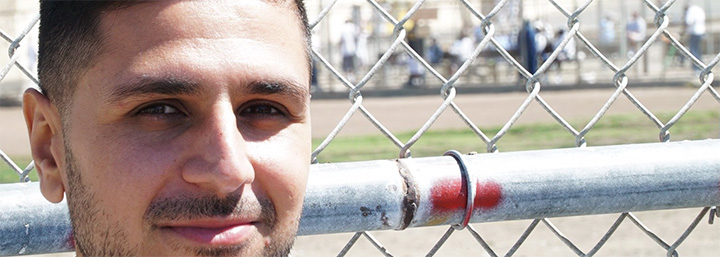Editor’s note:
As we wrote earlier, last Friday, 34-year-old Adnan Khan, who is one of our columnists, became the first person in the State of California to be re-sentenced, then released since the implementation of SB 1437, the law that changed the felony murder rule. Khan and his family are extremely grateful and relieved by his release, of course. But how will the new law that became active on January 1, 2019, affect other Californians, such as victims of crime, or crime survivors who have lost someone they loved. Respected justice reform expert, Rebecca Weiker, is the Program Director for Re:store Justice, and knows Adnan Khan well. But Weiker’s work is also deeply informed by the fact that she is a survivor whose beloved sister was murdered in 1992, which adds a crucial extra dimension as she explores these complex issues.
Criminal Justice Reform and Supporting Victims: It’s Not an Either/Or Choice
by Rebecca Weiker
On January 18th, Adnan Khan, the co-founder of Re:store Justice, had his sentence of first degree murder vacated. He was released to join his family, friends, and community after over fifteen years of incarceration.
Adnan was convicted under California’s felony murder rule, which allows someone to be charged and convicted for a murder that happened in the course of another felony being committed (like a robbery), even when the person involved was not directly responsible for the murder, and did not act with “reckless indifference to human life,” or was not a major participant in the felony itself.
Adnan was the first person released as a result of Senate Bill 1437, a new law that recognizes that we should hold people accountable for the harm they intend to cause, as well as the harm they cause directly, but not for the acts of others. SB 1437 allows for the release of people who were convicted under the felony murder rule, but neither harmed, nor intended to harm, anyone.
Over the last several years, many survivors of crime who have participated in Re:store Justice’s programs at San Quentin have come to know Adnan, his story, his humor, his compassion, and his deep commitment to supporting young people and survivors.
Our restorative justice work is invitational and non-directive. We respect each person’s journey, and never suggest that a person should feel, or act in any specific way. The finality and heartbreak of homicide is devastating, and until it happens to you, unimaginable. The impact of the loss never disappears.
The responses to having a loved one murdered are as varied as the individuals who lives were ended. Some of us withdraw and seem to leave the world of the living, remaining here in body, but not spirit. We turn our grief into anger and demand punishment that is swift and severe. We go towards faith and we turn away from God. We are forgiving and we dream of vengeance. We walk a path that doubles back, or turns sharply. We sometimes halt our journey altogether, living in suspended animation for many, many years.
And so what might be survivors’ response to this new law, that will release people who were originally convicted of homicide, but who under the law no longer meet the criteria to have received that sentence?
Some survivors of crime will feel that they are being re-harmed, that a re-sentencing diminishes or disrespects their loved one. Others may believe that criminal justice reform is not in opposition to survivor needs; that our prisons hold people who have received punishment far greater than what they “deserved” and/or are no longer a threat to public safety.
Adnan’s original sentence was 25 years to life. Under that sentence, he would have served at least nine more years in prison, at a cost of $81,000 a year, his full sentence would cost almost three quarters of a million dollars. That money is now available to pay for programs and services that can prevent violence: after school programs for children, support groups for homicide survivors, mentors for young people who are struggling, re-entry and job training services for formerly incarcerated people.
Yes, the ripple effects of violence are powerful and devastating. Yet for years to come there will also be waves of positive actions, both direct and indirect that will flow out from the release of Adnan Khan. His contributions, and those of others returning home under this new law, will lead to healing for individuals, families and communities.
So welcome home, Adnan. We look forward to your leadership as we work with survivors, currently and formerly incarcerated people, and community members to creating peace and healing together.
Post Script: To read more about Adnan Khan’s case, see our earlier news story.
 Rebecca Weiker is the Program Director for Re:store Justice. Her work is informed by her personal history; her beloved sister Wendy was murdered in 1992.
Rebecca Weiker is the Program Director for Re:store Justice. Her work is informed by her personal history; her beloved sister Wendy was murdered in 1992.


The writer of this article tries to deflect from the real issues, by writing about “costs” of the incarceration. While also playing on people’s emotional side. Bottom line, this individual was complicit in a crime. Further, plans don’t always go as planned. I am sure “he” knew something else might transpire in the commission of his original crime. Nonetheless, we’ll see what happens when these criminals continue to be released and continue with their propensity to commit more crimes.
Programs like re store justice do everything possible to make incarceration as expensive as possible. They then love to point out how expensive it is lock people up, and how much money we would all save if we would start releasing criminals. It’s a cynical ploy to fool an uninformed public. Notice the liberal white lady doesn’t want to “save” money, she just wants to funnel the cash to criminal justice programs like her own.
Beautifully written. As a survivor of homicide and a parent to the daughters of the homicide victim, I struggled with anger, resentment, and more confusion than I can articulate. I have benefited greatly from the work Re Store Justice does. It is one of few agencies that I’ve encountered that truly addresses the needs of both sides, uniquely, by bringing both sides together and creating common ground, while validating the feelings that come from losing someone to violence. I’m not naive. I realize that the incarcerated people I’ve participated in programs with were those that were already accountable. They were those that would not re-victimize me by not being accountable. Adnan was one of those men. I’ve learned a lot from him, and although I believe in fair punishment and serving time for crimes that are committed, I could not be happier that Adnan is free. I am one person who was willing to go inside a prison to get what I needed to heal for my children and model forgiveness for them. I’m excited that Adnan will now be able to reach survivors that may not have felt comfortable going inside prison to get that opportunity. Welcome home, Adnan!
@Jody. Yeah you can keep your “feel good “ comment. I am sorry for your loss and the trauma you faced, but I’m not buying the back end at all. I’m glad you used the word accountable. Whatever happen to accountability? I remember a time as a child when I got physically disciplined or locked in my room for my actions. I didn’t see it as abuse or excessive regardless as what was used. I never made that mistake again. I just read an article about a freshmen congresswoman talking about fighting isis with compassion, acceptance, and understanding. What the hell is wrong with people? Where do we draw the line? When commit committing a serious crime like robbery, you as an adult have to know that something bad can happen. If in that robbery a homicide occurs you are responsible, period. Murderers should not go free! Nor should any criminal or terrorist
Out of Touch, the punishment really should fit the crime, though, right? Part of the problem here is our justice system. Some people who kill get sentenced to 4 years, 7 years, or 12 years, in my case. Those were the sentences on the table for a man who killed someone while he slept, with his children present. Then we have someone who didn’t commit the murder serving potentially life. How does this make sense? This is like your parent locking you in your room forever for stealing cash out of her purse. I’ve never believed there should be no punishment. I think the punishment must fit the crime, and in our system, the way it is structured, that’s not how it works. The amazing thing about my experiences is that I don’t need you to buy that they were healing. I get to live it and compare the before and after. I know not everyone needs the same things to heal, but that’s the beauty of these programs….for those of us that need restorative justice, it’s there.